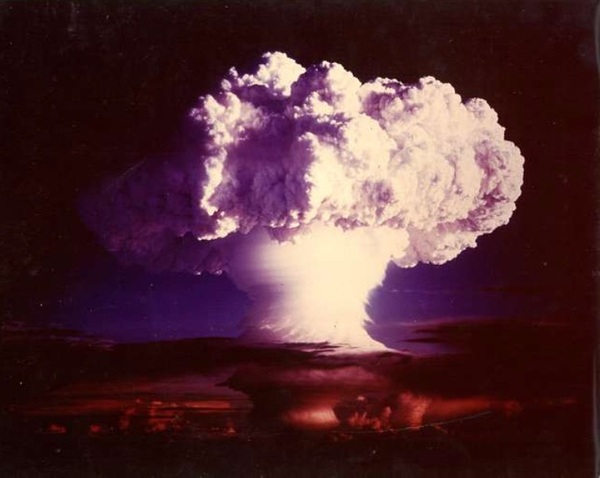
–>
October 6, 2022
With news that Israeli intelligence has detected an “irregular presence” of nuclear-capable Russian bombers near Finland and retired general David Petraeus casually saying NATO would likely sink Vladimir Putin’s Black Sea fleet if Russia used a tactical nuclear weapon in Ukraine, it’s perhaps time for a few questions:
‘); googletag.cmd.push(function () { googletag.display(‘div-gpt-ad-1609268089992-0’); }); }
First, can we discuss a situation that could very well result in thermonuclear war — and the end of life as we know it — intelligently and rationally? Or must all questions about our Dr. Strangelove policy be met with childish name-calling (e.g., “stooge of Putin!”) designed to silence debate?
 Second, is it a good idea to essentially tell a man who controls 6,200 nuclear weapons, and who our pseudo-elites may label “crazy,” you want to kill him? This is what Joe Biden’s and Ukrainian president Volodymyr Zelenskyy’s call for Russian “regime change” really amounts to, mind you.
Second, is it a good idea to essentially tell a man who controls 6,200 nuclear weapons, and who our pseudo-elites may label “crazy,” you want to kill him? This is what Joe Biden’s and Ukrainian president Volodymyr Zelenskyy’s call for Russian “regime change” really amounts to, mind you.
It’s important realizing that this conflict means infinitely more to Putin than it does to us. Our pseudo-elites are playing some kind of geopolitical game (with our lives and our children’s) as is their wont.
‘); googletag.cmd.push(function () { googletag.display(‘div-gpt-ad-1609270365559-0’); }); }
To Putin this is an existential crisis. Our globalist chicken hawks have ensured that.
Putin currently has no graceful exit from this situation. It’s apparently all or nothing, victory or death. Do you really think the wounded Bear will collapse into the waiting arms of those who’d devour him and not lash out, no-holds-barred, driven by self-preservation? Do we know what the phrase “Nothing to lose” means?
It’s time now for some realpolitik (there is a moral component here, too; more on that momentarily). In the early 19th century, we formulated the Monroe Doctrine, which stated that foreign intervention in the Americas could be considered a hostile act against the United States. Now, question:
Does Russia have a right to its own Monroe Doctrine? Or, a better question may be, can we realistically prevent it from effecting such?
Some may now say that Putin had no right to invade Ukraine. Fair enough. But we invaded Mexico in 1846 and overthrew Guatemalan President Jacobo Arbenz in a CIA-backed coup in 1954, to mention just two of our Latin American interventions. Whether we had a “right” to do so, or were right in doing so, is not the point here. We could enforce our will in our sphere of influence because we had the power. Saddam Hussein’s Iraq, for example and in contrast, could not — i.e., when annexing Kuwait — because it didn’t have the power. Yet Russia is no Iraq.
So, is this all about “Might makes right”? Not exactly. One element of what’s known as Just War Doctrine is that for a proposed military action to be moral, it must do more good than harm. Is this the case with our playing of chicken with Putin? The best-case scenario is that we help an internationalist pseudo-elite, Zelenskyy, retain power and preserve the borders of what even the left-wing Guardian called in 2015 “the most corrupt nation in Europe.”
‘); googletag.cmd.push(function () { googletag.display(‘div-gpt-ad-1609268078422-0’); }); } if (publir_show_ads) { document.write(“
The worst-case scenario is global thermonuclear war.
Do we really need the Fugaku supercomputer to do the cost-benefit analysis here?
Some may now wonder: Why do we have to back down? The answer is simple: Russia’s “Monroe Doctrine.”
Consider: President John F. Kennedy took a firm stand during the Cuban Missile Crisis, establishing a naval blockade of Cuba after the USSR deployed missile bases on the island. JFK took this hard line because it was our backyard, and you can’t back down at your own doorstep without losing an unacceptable amount of credibility on the world stage.
And so it is with Russia, with Ukraine being its Cuba. Like it or not, you can’t stomp around in another great power’s backyard like a t-Rex in Jurassic Park. That Moscow would lose too much face globally is, along with Putin’s existential concerns, another reason why Russia won’t back down in Ukraine.
Yet if this analogy is valid, what was the equivalent here of the USSR having put missiles in Cuba? Answer: The prospect of Ukraine joining NATO.
Putin said, repeatedly, that this was a red line for him. A little history is in order here, too.
NATO was created to counter the Soviet Union; thus, that evil empire’s early-’90s collapse made it rational for NATO to, in a sense, stand down. This is especially true since after the Berlin Wall’s fall, Russia pulled its army back to within its borders and arguably began behaving in a more pro-American fashion. Why, there was perhaps an even opportunity to forge friendly ties with Moscow, which, being characteristically European and Christian as we were, could’ve been a culturally congruent ally against China.
Instead, the pseudo-elite globalists expanded NATO to Russia’s very borders, the equivalent of Russia or China forging a military alliance with Mexico, Cuba, Canada and the Bahamas. In fact, despite then-U.S. secretary of state James Baker assuring Soviet leader Mikhail Gorbachev in 1990 that NATO would extend “not one inch [farther] eastward,” there are now on Russia’s borders four NATO members: Poland, Latvia, Lithuania and Estonia.
Again, what’s the cost-benefit-analysis verdict here? It’s clear how this military pact — and our Founders warned us about entangling alliances and involvement in European wars — benefits Estonia. But if there’s a Red Dawn and Russia or China lands troops on our soil tomorrow, will we say, “You know, normally I’d be beside myself. But let not your heart be troubled: Estonia’s got our back!”?
The insanity continues now, too. Finland and Sweden are poised to join NATO, and Ukraine is applying for expedited alliance membership. Of course, the latter could mean triggering WWIII with Russia, immediately. Is this rational?
Some do, of course, liken Putin to Hitler and warn that if we don’t take a stand now, it’s Ukraine today, the world tomorrow! This is more unserious, reckless talk at a perilous moment. Our planet is replete with evil leaders (it’s basically the norm), but not all are Hitler. Hitler was 44 when assuming power in 1933, and within six years had begun his war of conquest. Putin is 69, has been at the pinnacle of Russian power for more than two decades, has never exhibited world-conquest ambitions and perhaps is in his twilight years. But if the Hitler analogy must be entertained, alright, let’s follow it out.
Imagine it’s April 1945, and Hitler is in his bunker seeing his empire crumbling around him. But instead of being entirely impotent, he has at his disposal 6,200 nuclear weapons. What do you think he’d do?
There could be a reason to risk atomic annihilation — that Red Dawn scenario comes to mind. But does it make sense to possibly turn Putin into a man who just may want to see the world burn? All, too, over a corrupt nation in Russia’s backyard, whose battles are not our own?
And what’s with the regime-change obsession, anyway? China annexed Tibet and perpetrates cultural and demographic genocide there, and the Soviets rolled tanks into Czechoslovakia in 1968. But we don’t arm the Tibetans and didn’t do so with the Czechs, and in neither case is/was regime change a goal. We did invade Panama in 1989 and remove strongman Manuel Noriega from power, but he couldn’t incinerate the world. Taking this position with one of the world’s three nuclear superpowers is unprecedented — and seems far crazier than Putin could ever be.
Our “betters” — the same people who messed up Iraq, Afghanistan and Libya and who managed COVID with not even that level of competence — may say, as Lindsey Graham has, that a Putin underling would shoot him before allowing him to launch nukes. Well, that’s a lot to bet our lives on.
But, hey, our pseudo-elites may have well-equipped fallout shelters to retreat to. And you?
Contact Selwyn Duke, follow him on MeWe, Gettr or Parler, or log on to SelwynDuke.com
<!– if(page_width_onload <= 479) { document.write("
“); googletag.cmd.push(function() { googletag.display(‘div-gpt-ad-1345489840937-4’); }); } –> If you experience technical problems, please write to [email protected]
FOLLOW US ON
<!–
–>
<!– _qoptions={ qacct:”p-9bKF-NgTuSFM6″ }; ![]() –> <!—-> <!– var addthis_share = { email_template: “new_template” } –>
–> <!—-> <!– var addthis_share = { email_template: “new_template” } –>






